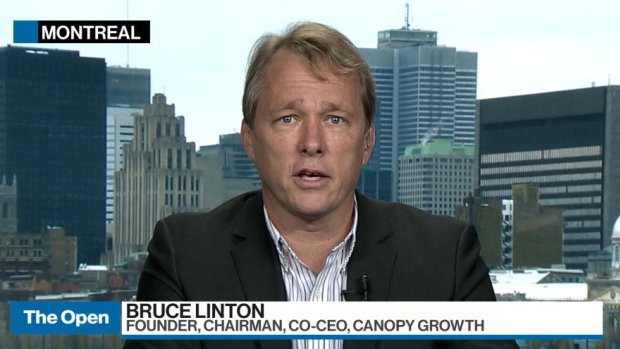Sep 27, 2018
Ontario's retail pot plans has Canopy eyeing partnerships: Linton

The head of the country’s biggest pot company says he would be willing to partner with retailers and license his company’s brand for free after Ontario announced it’s planning to limit cannabis producers to just one retail store in the province.
Canopy Growth Corp. Chairman and Co-CEO Bruce Linton told BNN Bloomberg that he’s mostly shrugging off Ontario’s proposed legislation, which allows for an unlimited number of stores that can sell recreational cannabis, but restrains licensed growers to only one store each at a production site.
“It’s like a game board of snakes and ladders that gets drawn over again every day,” Linton said in a telephone interview. “We’ll work our way through whatever we can open. If we can license the Tweed brand to stores for a dollar, or for free, if possible, without contravening the rules, then we’ll look at doing something like that.”
The legislation, which was tabled in Queen’s Park Thursday, may also include a provision that could restrict how many licenses a single entity could hold, although no number has been set, according to a government official who spoke on background to BNN Bloomberg.
That provision is to be determined at a later date and aims to ensure the market isn’t dominated by a single player, the official said. On Wednesday, multiple sources told BNN Bloomberg Ontario may cap the number of cannabis retail licences that any single entity can own at 10 per cent of the total available allocation.
That point remains the “biggest unanswered question” for the cannabis industry as it eyes the opportunity to expand in Canada’s most populous province, according to RBC Capital Markets analyst Sabahat Khan in a report to clients Thursday.
- Here’s where Canadians can buy cannabis on Oct. 17
- Baggies, no more: What pot products will look like when they hit Canadian shelves
- Know your CBD from THC? The cannabis buzz words you need to learn
RELATED: CANNABIS CANADA
“Given today’s commentary from the Ontario government, the province could potentially set an ownership threshold, where a retailer can receive an equity investment from an [licensed producer] up to a certain ownership percentage, and still operate retail cannabis stores in the province,” Khan said.
Shares of Canopy and Aurora Cannabis Inc., which has a 20 per cent stake in Alberta-based liquor retailer Alcanna Inc., were down 2 per cent in early morning trading on the Toronto Stock Exchange. Alcanna has licensing rights to open cannabis stores under the Aurora brand name across Canada.
Linton said that operating more retail stores is the company’s main objective once cannabis is legalized in Canada next month, with the company planning a nation-wide presence with firm strongholds in Manitoba, Alberta and Eastern Canada.
“Initially, we thought we’re going to be capped at 35 stores in Ontario, but we just want to get them all open regardless of who owns them,” Linton said.
Other factors that haven’t been ironed out is how franchising could work in Ontario’s new cannabis retail plans and whether producers could sell franchise licenses to prospective franchisee owners who would wholly own their store, said Steve Ottoway, managing director of investment banking at GMP Securities. “That’s not clear as of yet,” Ottaway said. “It‘s going to be quite interesting as to whether they go to the extent of looking at shareholders in each one of those operations to determine if in the background is an [licensed producer],” he told BNN Bloomberg on Thursday.
Cannabis Canada is BNN Bloomberg’s in-depth series exploring the stunning formation of the entirely new – and controversial – Canadian recreational marijuana industry. Read more from the special series here and subscribe to our Cannabis Canada newsletter to have the latest marijuana news delivered directly to your inbox every day.





